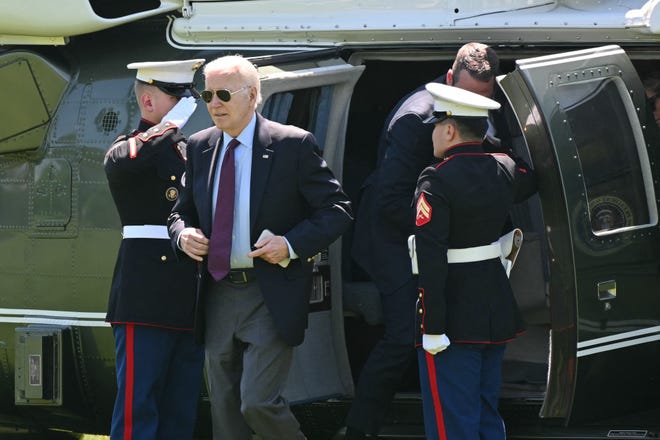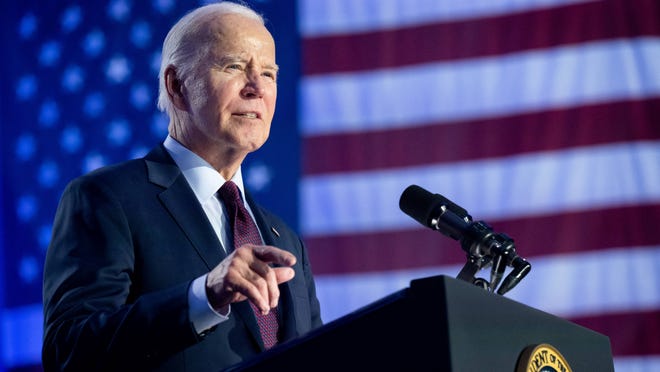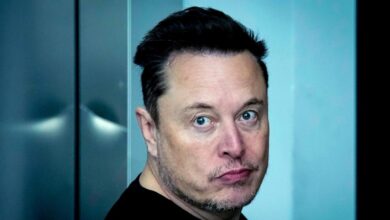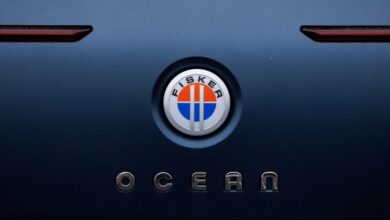Biden slaps new tariffs on Chinese electric vehicles, other goods

WASHINGTON ― President Joe Biden is hiking tariffs on electric vehicles, semiconductors and several other goods imported from China, escalating a trade war between the two world’s largest economies as the U.S. accuses Chinese competitors of unfair practices in industries the U.S. is trying to grow.
The moves, which come amid rising tensions between the U.S. and China, are designed to protect American industries in clean energy that the administration has targeted with major investments to try to catch up with China.
Other goods from China slapped with higher tariffs include solar cells, batteries, battery materials, cranes used at ports, and certain medical supplies, as well as steel and aluminum imported from China.
More:Biden sends message to China ― and working-class voters ― with tariff threat
The Biden administration has for months accused China of unfair trade practices by flooding the global markets with goods at artificially low prices, putting U.S. manufacturing of electric vehicles, microchips and other goods at a steep disadvantage.
Prep for the polls: See who is running for president and compare where they stand on key issues in our Voter Guide
Lael Brainard, director of the National Economic Council in the White House, said the objective of the higher tariffs is to “make sure that historic investments in jobs spurred by President Biden’s actions are not undercut by a flood of unfairly underpriced exports from China.”
Biden, whose administration reviewed the tariff rates over the past year, is keeping intact more than $300 billion in tariffs imposed by former President Donald Trump. Biden will announce the new increases during a White House speech Tuesday.
Some of the tariff hikes include:
- Electric vehicles from China: from 25% to 100% beginning this year.
- Semiconductors from China: from 25% to 50% by 2025.
- Lithium-ion batteries from China used in electric vehicles: from 7.5% to 25% this year.
- Solar cells imported from China: from 25% to 50% this year.
- Steel and aluminum products: form 0%-7.5% to 25% this year.
- Ship-to-shore container cranes imported from China: from zero to 25% this year
- Hospital syringes and needles made in China: from zero to 50% this year.
China pushed back strongly against the higher tariffs.
Wang Wenbin, a spokesman for the Chinese Ministry of Foreign Affairs, called the moves “self-defeating” and against the consensus reached last November by Biden and Chinese President Jinping Xi during a summit in San Francisco.
“More importantly, it will harm the world’s green economic transition and climate action,” Wenbin said. “We urge the U.S. to stop repairing and digging up the road at the same time, so to speak, and create enabling conditions for China-U.S. climate cooperation and global green transition.”
Another ministry spokesman last Friday said, “China will take all necessary measures to defend its rights and interests.”
More:President Biden moves to triple tariff rates on Chinese steel and aluminum
The moves come as Biden is courting the support of working-class voters in Midwest battleground states including Michigan, the center of the U.S. auto industry, for the November election.
Biden is borrowing from the trade playbook of Trump, the Republican presumptive nominee, who routinely raised tariffs on Chinese goods during his four years in office.
“Where have you been for the last three and a half years? They should have done it a long time ago,” Trump said Biden’s tariffs, speaking outside a New York courtroom, where is attending day 17 of his hush-money trial. “But they’ve also got to do it on other vehicles, and they have to do it on a lot of other products. Because China’s eating our lunch right now.”
Biden has sought to differentiate his tariff approach with his predecessor’s plan for new tariffs. Biden last month slammed Trump’s campaign proposals as “across-the-board tariffs on all imports from all countries that could badly hurt American consumers.” Trump has proposed a 60% or more tariff on all Chinese imports and warned the U.S. auto industry will face a “bloodbath” if he loses his election in November.
Biden has staked his economic agenda on reigniting a U.S. manufacturing boom centered on electric vehicles and clean energy.
The Biden administration says it has helped spur more than $860 billion in private investment through legislation passed during Biden’s first two years in office that incentivized the manufacturing of electric vehicles, clean-energy products, microchips and other investments.
Brainard said the tariff hikes will “ensure that American businesses and workers have the opportunity to compete on a level playing field in industries that are vital to our future such as clean energy and semiconductors.”
More:‘A con’: President Biden trolls Trump with $3.3 billion Microsoft AI project in Wisconsin
Biden called for the tripling of tariffs on steel and aluminum imports from China during a campaign speech last month before the United Steelworkers union in Pittsburgh.
Each of the tariff increases reflect the recommendations of Biden’s United States Trade Representative, Katherine Tai, who evaluated the rates as part of a mandatory four-year review.
Reach Joey Garrison on X @joeygarrison.




